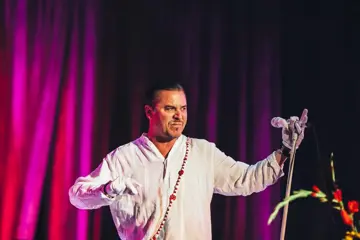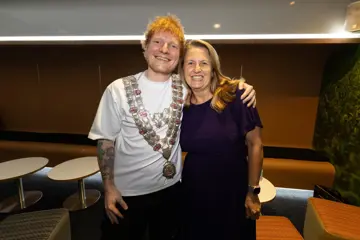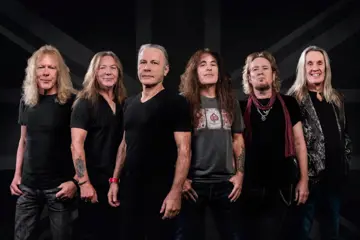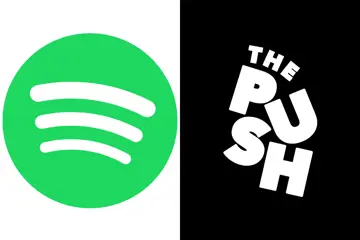If there's any artist out there at the moment who's making waves in the electronic scene, it's probably Simon Green, aka Bonobo. Constructer of dense, atmospheric sounds, he's probably best known for the fluid evolution of his sound, with no record giving too much away about what might come next, much on the same tack as Four Tet or recent visitor Oneohtrix Point Never. Five albums down, it's hard to put a pin into any formal classification of Green's music; it is what it is, and it has impressed. His latest work, The North Borders, has more or less grafted him into the mainstream electronic psyche, and that probably won't change for a while. To understand how he came to such a spellbinding record, we need to go back a bit to 2010, after its precursor Black Sands was released.
Following a monster tour supporting Black Sands, Green moved to New York, something of a big deal for someone who has been so heavily connected with the London sound. That impression undercuts Green's decision, though. “Well, I guess I just sort of had the opportunity to do it,” he answers when asked what prompted the move. “I didn't want to look back and say to myself, 'I could've moved then'. And I love New York, and I do a lot of touring throughout the US. It's kind of right in the middle of the world; it's omni-distant from everywhere else. You have that placement between the west coast [of America] and Europe. I mean, it's New York, everyone should spend some time there. It's not going to be forever, but it's nice to be here right now. You know, I don't make every life decision based on musical reason either, which is what a lot of people assume. But then, I think life informs music: that's the thing that comes after it. I just wanted to be in New York because I love the city, really.”
Even though moving to New York is one of the great dreams – especially if you're a musician – Green doesn't feel any need to re-establish his style. In the 21st century, after all, music is global. Green agrees. “I don't think music is as geographically specific as it used to be,” he explains when asked how The North Borders was still born with a very London-based style. “You know, you look back at America and the white labels coming out of there ten, 20 years ago, and it's music that people wouldn't hear in Europe for another two months. But now, when something gets played on a radio show in London, it's up on SoundCloud and people listen to it in San Francisco almost instantly. A record is broken worldwide in one day now, whereas before things would trickle down through certain feeds and certain cities, and they would blow up here or there before moving on to somewhere else. Now I think those geographical boundaries are lessened and they're less significant. To answer your question, yeah, I think I did make a very London-sounding record in New York. But there's people doing that now: FaltyDL and Machinedrum, even though they're from Brooklyn, they make very European-sounding music as well. It's a theme that's growing every day.”
It's an interesting notion, one that argues the idea of how the traditional modes of localised sound – the ideas of a 'London record' or a 'New York record' or a 'Berlin record' – have been eroded by worldwide connectivity. “I think, so, yeah,” Green concurs. “I mean, it's true to the extent that some cities still have a sound; Berlin, definitely. In terms of America, if there's people who like that idea of bass music... I mean, I know people in San Francisco who make music that sounds like they're from South London. I think that the internet has had a big hand in bringing everything closer and making everything smaller now. That can be a good and bad thing, but it's exciting to have that element in play.”
Don't miss a beat with our FREE daily newsletter
The North Borders certainly seems to take something from that notion of delocalisation. While the London sound may still be the building block, there's a lot more at play here. Green wanted to change the flow of what he had previously done, and go back to the solid house-based club sound he started in. “I mean, I think this is going back to the idea of sort of solo programming,” he says. “I think there's less live elements on this record then there was on Black Sands. I kind of wanted to move away from that sample-heavy, downtempo sort of sound. I wanted to try something a bit different with this one, so that was essentially the germination of it. I was trying to make my music more relevant to what I'm actually listening to and what I'm into. I wanted to be honest about what my interests are, and what a Bonobo record is supposed to be in my eyes.”
What Green is referring to is the music he is most into, and this might just be a caveat to those free-form, avant-garde fans out there: club music. It's no secret that Green is an accomplished DJ (look up his Boiler Room set for proof), but he also has to find middle ground between what people have come to expect from Bonobo, and the four-four dance sound that he originally found a home in. It's the old DJ crowd expectations-versus-tastes argument, so to speak. “Oh yeah, definitely,” Green says. “It's something I really feel when I'm DJing. When people come to my gigs because they've bought a record, it can be a bit... dangerous. I sometimes think that I'm playing to the wrong crowd, occasionally. I play more kind of club music, you know; I'm more inspired by the house, 130 bpm, 2-step bass music kind of stuff. And I feel that a lot of people come to my shows expecting jazzy, downtempo sort of stuff, and that's not really what I do as a DJ. Sometimes it's really nice to play to crowds that have no expectations, and just move a crowd that way. But I've always come from being a club DJ firstly, and I think that confuses some people. I try to represent as much of my sound as I can in my DJ sets, but it gets tricky. There's a set that I feel I'm obliged to play, and there's the set that I want to play, and I try to strike a balance between those two a little bit.”
That being the old struggle, does Green have any luck finding those kinds of 'no expectation' gigs? “Not really, not so much these days. The times they have been were like unannounced shows at festivals, or showing up at parties and just letting it go. They're not my official gigs, but sometimes you get to play these one-off parties where no-one's expecting anything. That's always a lot of fun.”















